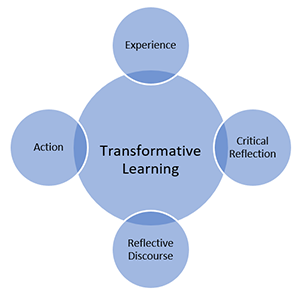Date Published June 5, 2019 - Last Updated December 17, 2019
I remember as a kid watching the Transformers Generation 1 cartoons in the 80s and thinking how cool it would be to be able to transform into a vehicle or weapon and save the world. This concept of transformation has not only permeated pop-culture cartoons, it has impacted our business world and even more specifically learning with the goal of not saving the world but changing it.
Transformative, or transformational, training is a concept developed by many different individuals through many different lenses. Jack Mezirow developed a transformative training theory that focuses on transformations in our attitudes or beliefs. Mezirow defines learning as “the process of using prior interpretation to construe a new or a revised interpretation of the meaning of one’s experience to guide future actions.” This interpretation to guide future actions is so valuable to our learning process in service and support. Transformative training contains four key components that are critical the learning process. Think about how each component is implemented in your current learning development process.

-
Experience: This is where the process begins, the learner experiences a shift in perspective. More practically for our world, there is an issue/incident/ that can’t be solved, or the learner has an experience they just can’t wrap knowledge around. Think about how we allow learners to track these experiences and then move through the process.
-
Critical Reflection: Reflection is similar to problem solving and Mezirow talks about how we “reflect on the content of the problem, the process of problem-solving, or the premise of the problem. Through this reflection we are able to understand ourselves more and then understand our learning better. This is where the learner reflects on what they need to learn and why. Think about how to provide tools for learners to self-reflect and baseline knowledge.
-
Reflective Discourse: “Discourse is dialogue devoted to searching for common understanding and assessment of the justification of an interpretation,” according to Mezirow. Discourse is where the learner discusses the experience with peers, mentors, and subject matter experts to develop clearer understanding and even a knowledge solution. This can happen through coaching, mentoring, or even engagement with a knowledge process. Think about how we enable real-time, positive engagement of a reflective discourse process to enable deeper understanding and solutions.
-
Action: This is the final stage, where the learner implements what they have learned through discourse, reflection to a final learning stage. Action could be the creation of a knowledge article, standard operating procedure, or the engagement of learning through various channels. Think about how to enable action in the learning process and also how to measure the effectiveness of your learning, so that the process can be continuously improved.
This transformative learning process can be slow or immediate, and it doesn’t have to be huge learning experiences. In my view, any learning that moves a learner from one state (i.e., didn’t know how to resolve an incident) to another state (i.e., now knows how to resolve the incident) is transformative. We have moved, we have resolved, we have performed an action. Don’t underestimate the power of these transformative experiences that happen daily in our roles as service and support leaders. It’s our job to enable and foster the environment, create the process, and engage our teams throughout the learning experience.
It’s our job to engage our teams throughout the learning experience.

As the Director of Training and Content for HDI, Fancy brings more than 20 years of experience specializing in consulting, training, and human resource development. Her main area of focus has been working with service and support centers and contact centers across various industries to optimize their performance. As an ICMI and HDI Business Associate, she certified thousands of service and support professionals, managers, directors, analysts, agents, technicians, and corporate trainers around the world in virtual and classroom environments. In addition to training, she has developed and facilitated customized curriculum and training and consulted for Fortune 500 companies in the areas of customer service, customer experience, quality management, workforce management presentation, communication, and time management skills. Fancy has also served as a speaker for various industry conferences and events such as Fusion, HDI, and ATD and holds a master’s in human resource development with a specialization in adult education from Texas A&M University. A fifth generation Texan, Fancy lives in Austin with her husband Kevin, son Mills, and their tabby cat Sparky. She's an avid sports fan, including supporting the Dallas Cowboys and all Texas A&M sports. Her favorite team is anyone her son is playing on!